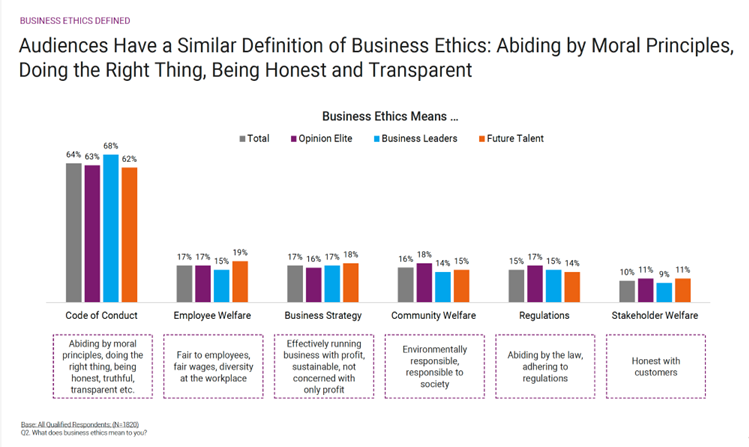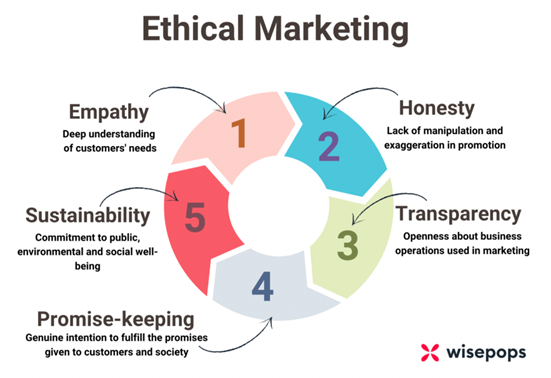new! listen to article
“Ethical Marketing Practices.” This expression is certainly a contradiction. Or is it?
Today, many people want to be more environmentally and ethically conscious when purchasing products.
At the same time, many companies are wondering how to transform their corporate social responsibility (CSR) efforts into more comprehensive environmental, social, and corporate governance (ESG) practices that can put them at the core of their business models. We are considering.
It's only natural that companies change over time and change the way they market their brands.
Business ethics is always an important concept. However, given recent changes in customer expectations, it is even more important than ever that the way organizations market themselves in modern society is authentic.
To be successful in the long term, companies must adhere to higher ethical standards.
But how do you make the switch from traditional models to ethical marketing practices? How do you make sure your messages don't come off as corny or mislead your B2B customers?
And what exactly do we mean by “ethical marketing practices”?
What are ethical marketing practices?

Source: aicpa-cima.com
In short, ethical marketing is a strategy that prioritizes responsibility, transparency, and trust in all marketing materials and campaigns. Fundamentally, this shows that a company is prioritizing equity and value over making a profit.
Ethical marketing is closely related to business ethics. Modern companies are increasingly emphasizing ethical practices, from the welfare of employees, communities, and stakeholders to their codes of conduct and business strategies. As a result, they will undoubtedly want to convey a responsible attitude to their customers in order to foster trust, improve their company's reputation, and differentiate themselves from competitors.
However, clients and customers are becoming increasingly savvy. They understand the market and have high expectations in everything from value for money to customer service.
But instead of telling customers what they want to hear (even if it's not exactly correct), responsible companies stick to the truth. Therefore, a company's ethical marketing practices should consider the following:
- communication. Ethical marketing revolves around being honest in your communications, a practice that businesses of all sizes should already follow. Avoid dishonest or misleading information or exaggerated claims, whether in traditional advertising or social media posts. Be sure to include details related to the lawful use of your product or service. Focus on the value your business brings to your customers and the positive impact it has on your stakeholders.
- Pricing. Companies want to differentiate themselves as high-end service providers through competitive product pricing or premium pricing models. But marketing your business ethically means avoiding market domination.
- Legal obligation. From marketing codes of conduct to data protection laws, there are a variety of legal considerations that ethical businesses must adhere to. In addition to being aware of these, it is important to use marketing strategies to inform clients about your practice. This may include data management and ownership.
- Social media. Businesses are increasingly turning to social media platforms to generate leads. While it's tempting to take advantage of trends that increase your reach, it's important that your paid ads and posts truly reflect your brand's ethical practices and product offerings.
Keep in mind that ethical marketing includes a wide range of behaviors that vary by sector, product, and service. For example, in some of her B2B software, clients may want to better understand how employee data is collected and stored and know that they can request access to sensitive information at any time.
When your marketing is honest, your clients are more likely to trust your brand and develop a long-term relationship. This is very important in his B2B field. This approach can cover everything from the ads you create to the information your omnichannel contact center agents provide.
Machine learning models can be used to identify changes in client expectations and needs, which can also inform subsequent marketing strategies.
One way to move towards ethical marketing practices is through the ethical use of artificial intelligence to better understand behavior. AI can help you identify patterns and trends in your industry, informing your marketing strategy, and ensuring you meet the evolving needs of your target audience.
Additionally, email tracking provides valuable insight into how people are engaging with your marketing messages, helping you optimize your email campaigns for maximum impact.
Ethical marketing practices should extend to all aspects of a company's operations, including marketing materials. It is important to ensure that the claims made in marketing materials are accurate and transparent, and that the language used is not misleading or overly promotional.
By creating honest and informative marketing documents, you can build trust with your clients, increase customer satisfaction, and foster long-term relationships based on transparency and trust.
Why ethical marketing practices matter

Source: wisepops.com
Trust is at the heart of most business relationships. While the quality and value of products and services remain important factors in establishing trust, there is also an increasing focus on social responsibility and environmental sustainability.
Therefore, marketing efforts must be transparent to create trust and increase customer engagement.
If your marketing is dishonest, it will be discovered quickly. Business leaders talk to each other, so if marketing claims don't meet expectations, word can spread and reputations can be severely damaged.
Ask yourself how transparent and promotional your marketing content is. Today's managers will be happy to walk away if they feel the content you're putting out is littered with inaccuracies, misinterpretations, or exaggerations. And there may be plenty of competitors for them to choose from.
Two common examples of unethical marketing practices to avoid:
- Greenwashing: An organization (or its marketer) exaggerates how environmentally friendly the company is. His 58% of global executives admit their “green credentials” have been exaggerated.
- Wake wash: Companies use certain social ideals in their marketing, even if they do not align with their core values. The practice may even contradict the movement.
How to move towards ethical marketing practices
One of the main drivers of a company's marketing strategy is to give customers what they want (or what we think they want).
However, as marketers, we need to be aware of the changing tastes and needs of our target audience and the evolving practices of the organizations we are marketing to.
If you want to implement ethical marketing practices, base your efforts on these five fundamental principles.
- Honesty: Go beyond marketing messages. This also includes other elements such as returns management in e-commerce.
- sustainability: Please provide evidence that your company actually uses sustainable practices or uses sustainable materials in its products.
- empathy: Demonstrate understanding of customer sentiment and pain points. This will ensure that your marketing practices are perceived as authentic.
- Transparency: People no longer accept things at face value. Messages require complete transparency.
- I keep a promise: If you don't deliver on your marketing promises, people will look elsewhere.
By its very nature, all marketing can be said to be manipulative in some way. But when you put ethical marketing practices into practice, that truism no longer rings true.
If you can honestly convince your customers that your brand is better because of its environmental impact and corporate governance, you will not only achieve your business objectives, but also contribute to positive change in the wider world. Masu.
Additional resources on ethical practices in marketing and business
Why honesty and integrity pay off: The benefits of truth-based marketing
How to create socially responsible B2B marketing campaigns
Guide to Business Ethics and Social Responsibility [Infographic]


